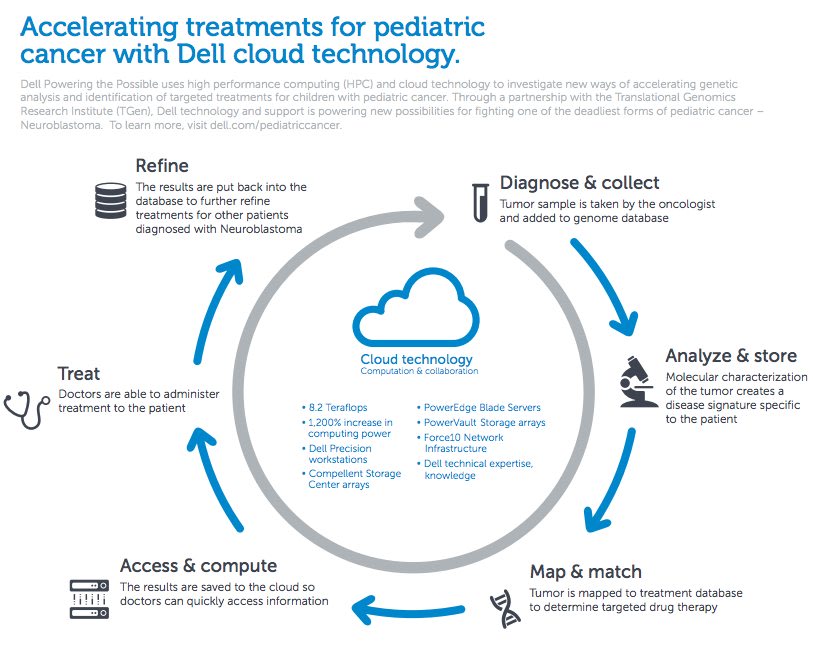Imagine making real time data available of various forms of tests, or of patient history so that by the time you, an emergency case, arrives at a hospital, all of your medical records are right there and and there are no delays in your physical examination. In so many parts of the world, this could be a real life-saver.
- Build sustainable healthcare systems
- Collaborate to improve care and outcomes
- Increase access to healthcare
With a growing need for efficient and accessible healthcare, companies and healthcare organisations are starting to invest in applications and analytical tools that help healthcare stakeholders identify value and opportunities. Dell currently places an emphasis on healthcare, they have been working with big data for a while now in areas such as genomics and personalized medicine. Dell's main goal is to help doctors in making the most accurate diagnose as possible in order to perform the best treatment to ill patient. As it can be seen in the following process image, here is an example on how big data comes to play an important role in the near future.
However, do note that this is contingent on the accuracy of data provided to the physicians. This is critical. Any form of inaccuracy can be fatal. While looking for examples on how data can fail healthcare facilities, I found this:
"My younger brother was born under circumstances that caused him to be transferred immediately to a neonatal ICU. In the same unit, another infant had been born with all of his organs outside his body. He had survived surgery and his vital signs were being monitored with a pressure mat in his incubator. On one visit, his father lifted him out of the incubator and noticed the monitor was still registering the baby. He gave the child to the mother, placed a stuffed animal in the incubator, and covered it with the blanket. You can imagine what happened when the father called the nurse to check on the baby and she discovered a stuffed tiger instead."
(Source: Making Data Meaningful, Lucrum, Dec 10 2012)
Imagine if the data a physician was meant to use was completely non-existent in real life, and imagine the consequences!
Despite the various concerns with using Big Data, it is clear about the extremely important role it will play in Healthcare in the near future. If used correctly, it will help physicians and the healthcare sector to reduce uncertainty, hence improving the quality of life patients.
"My younger brother was born under circumstances that caused him to be transferred immediately to a neonatal ICU. In the same unit, another infant had been born with all of his organs outside his body. He had survived surgery and his vital signs were being monitored with a pressure mat in his incubator. On one visit, his father lifted him out of the incubator and noticed the monitor was still registering the baby. He gave the child to the mother, placed a stuffed animal in the incubator, and covered it with the blanket. You can imagine what happened when the father called the nurse to check on the baby and she discovered a stuffed tiger instead."
(Source: Making Data Meaningful, Lucrum, Dec 10 2012)
Imagine if the data a physician was meant to use was completely non-existent in real life, and imagine the consequences!
Despite the various concerns with using Big Data, it is clear about the extremely important role it will play in Healthcare in the near future. If used correctly, it will help physicians and the healthcare sector to reduce uncertainty, hence improving the quality of life patients.
"I don't expect to get yesterdays medicine. If I can help it, I'd like to get tomorrow's medicine". (Elizabeth Edwards)
We strongly believe that big data is tomorrow's medicine.
We strongly believe that big data is tomorrow's medicine.


Thanks for the article on big data and health care. Let's hope that these technologies are also rolled out to low and middle income countries. If you are interested in hearing more about how we can make it happen, check out our blog! http://ibeliebersie.blogspot.com.es/2013/08/big-data-bigger-health-inequality.html?showComment=1379675276266
ReplyDeleteBig Data
ReplyDelete